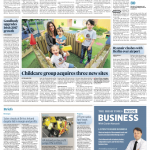John Collins is Assistant Business Editor in The Irish Times and in 2006 was awarded the Net Visionary Journalist of the year. The Irish Times is a top priority for many PR campaigns and John is well placed to give insights into what it is journalists from the paper expect and need from pitches. We also ask John for his insights into how the media business is changing in Ireland and what his thoughts are on the influence of the rise of the internet and the recession on news reporting.
PR agencies and their clients consistently put a very high value on coverage in The Irish Times. Why do you think this is so?
Besides the quality of what we produce? I think it’s a hangover from our days as the “paper of record” – if your story is carried in the paper it has got there on merit. We also have the highest readership amongst business executives so there is a lot of competition to get coverage on our finance pages.
The Irish Times website is one of the most popular in the country. Do you think we will see the paper move fully online in our lifetime?
That’s something we’ve been debating internally recently. My gut instinct is no. Too many people still want a physical product in their hand. Not withstanding the improvements in mobile technology and electronic readers like Amazon’s Kindle, I have yet to see a technology that will replace the written word on paper. It’s also interesting that Politico, the Washington politics site that has been held up as offering a new business model for journalism, is now profitable largely due to the paper it publishes three times a week. The nature of the paper product may change in my working life but I think there will always be a physical product that people will be able to hold in their hand.
The workload on journalists has increased given both the economic downturn and the demand for regular online content. Do you think that this is a risk to the ability of journalists to be truly investigative as they are put under increasing pressure to produce more volume of copy?
Absolutely and it’s the real worry about the cuts that papers are having to make in the face of this recession. Not only are we faced with increased competition from online (where frankly the rates for advertising will never replace what newspapers could command as recently as 18 months ago), but we are seeing a sharp downturn in advertising. Our organisation, along with all other Irish media, has had redundancies and those left are faced with doing more with less.
Do you rate Twitter as an emerging breaking news service? Do you feel that Twitter is a threat or an opportunity to traditional media in relaying news?
Twitter has been first with stories like the Mumbai terrorist attacks and it really is fascinating watching stories like that develop in real time. Despite this I don’t see it as a threat but more a complementary service. While you might hear about an incident on Twitter you are still going to turn to a newspaper to find out what it means. We’ve been experimenting with Twitter over the last year with our @IrishTimesBiz account. We’ve done live Tweets of the Budget and also the publication of the two reports into Anglo Irish Bank as well as sending out links to the stories we publish online. People have to remember however, that Twitter is still very much the domain of an educated elite and most people aren’t even aware of it, as recent research has shown.
How much value do you put on blogs for research purposes?
I find that they have actually decreased in relevance in the last two years or so. Most of the most popular blogs now come from traditional media outlets. There are some that still generate ideas – I love what The Irish Economy has contributed to the debate over the last year – but in terms of ideas and trends Twitter has become more useful.
Is the press release dead or dying?
I noticed a high profile PR guy said at a debate earlier this year that financial journalism was largely press release driven, which I wouldn’t agree with. I’ve just finished putting the two finance pages to bed for tomorrow’s paper. Of the 14 stories we are carrying tomorrow, four came from press releases from Irish PRs, but a significant amount of phone calls would be made to try and tease out new angles on those stories. A lot of people suggest “press release journalism” will become more common due to media cutbacks but I think good journalists who know the sector they are writing about will always get scoops and exclusives. At the end of the day that’s what newspapers like The Irish Times are good at and it’s what will differentiate us from the pages and pages of free comment and opinion available online.
What is the format, tone and layout of the ideal press release for you?
Short, to the point, jargon free and with the mobile number of the client (not the PR agent) at the bottom. Put the headline as the subject line and don’t use attachments. Subject line “press release” with attachment called “press release” drives us mad but people are still doing that.
What are the elements of an ideal PR pitch to you?
Make it short – if you can’t say it in less than a minute it’s too complex. Make sure it’s relevant. Just because I’ve covered technology for years doesn’t mean I am interested in your clients new enterprise storage hardware. You really wonder sometimes if the person pitching has read your paper – it’s essential you are familiar with what someone covers before you ring them up and ask them to listen to your pitch. It also helps to have some appreciation of the person’s working day. I like to think of myself as a reasonable person but if you ring me on deadline and launch into a pitch for the following week, I may be quite unreasonable!
What makes you consider someone as a go-to expert when researching a story?
Someone who is willing to give you the background information you need without trying to push their own product or service. You are more likely to use a quote from someone who shares their expertise and points you in the right direction than someone who merely talks about how their service could have prevented something happening in the first place.
Have you any tips for budding journalists on how they can land a dream job as a staff writer in The Irish Times?
Get a real job! But seriously don’t be afraid to knock on the door, don’t wait to see something advertised. Journalists in the paper are a good source of where openings may exist or what sections are more likely to be looking for freelance contributions.
They should also remember that journalism requires putting in long hours for pay that is relatively low compared to what you’d get paid for doing a similar job in another sector. That said it’s hugely rewarding.
Any interesting anecdotes from your time as a journalist?
Many, but I’d like to stay working at The Irish Times!





